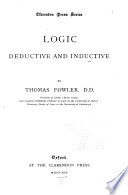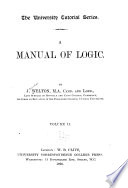 | Thomas Fowler - 1895 - 620 pages
...previous inductions. METHOD OF RESIDUES. CANON. Subtract from any phenomenon such part as is known to be the effect of certain antecedents, and the residue...phenomenon is the effect of the remaining antecedents. If the antecedents are A, B, C, D, and the complex phenomenon can be resolved into the consequents... | |
 | William Gay Ballantine - 1896 - 200 pages
...or an indispensable part of the cause, of the phenomenon. FOURTH CANON. For the Method of Residues. Subduct from any phenomenon such part as is known...phenomenon is the effect of the remaining antecedents. FIFTH CANON. For the Method of Concomitant Variations. Whatever phenomenon varies in any manner whenever... | |
 | James Welton - 1896 - 374 pages
...any phenomenon such part as is known W Resi"by previous inductions to be the effect of certain ues> " antecedents, and the residue of the phenomenon is " the effect of the remaining antecedents." Symbolic formula : If A — a, B — b are known to be causal sequences, then, given ABC — abc, it... | |
 | Richard Falckenberg - 1897 - 686 pages
...or the cause, or an indispenable part of the cause, of the phenomenon." (3) The Methoi of Residues: "Subduct from any phenomenon such part as is known...phenomenon is the effect of the remaining antecedents." (4) The Method of Concomitant Variations: "Whatever phenomenon vane; in any manner whenever another... | |
 | William De Witt Hyde - 1897 - 364 pages
...or the cause, or an indispensable part of the cause of the phenomenon." The Method of Residues is, " Subduct from any phenomenon such part as is known...phenomenon is the effect of the remaining antecedents." The Method of Concomitant Variations is, "Whatever phenomenon varies in any manner, whenever another... | |
 | 1897 - 830 pages
...the following rule or canon: Subduct from any phenomenon such part as is known by previous induction to be the effect of certain antecedents, and the residue of the phenomenon is the effect of tlie remaining antecedents. The more our knowledge is extended, the more able are we to proceed on... | |
 | James Edwin Creighton - 1898 - 418 pages
...whole fact under consideration. Mill's fifth canon seems to apply to this case. It is as follows : Subduct from any phenomenon such part as is known...phenomenon is the effect of the remaining antecedents. Thus, if it is known that the complex phenomenon BAG is the result of hoc, and if it is further known... | |
 | Elias J. MacEwan - 1898 - 440 pages
...or the cause, or an indispensable part of the cause, of the phenomenon. "4. Method of Residues. — Subduct from any phenomenon such part as is known...phenomenon is the effect of the remaining antecedents. " 5. Method of Concomitant Variations. — Whatever phenomenon varies in any manner whenever another... | |
 | Elias J. MacEwan - 1898 - 482 pages
...cause, or an indispensable part of the cause, of the phenomenon. "4. Method of Residues.—Subduct from any phenomenon such part as is known by previous...residue of the phenomenon is the effect of the remaining antecedent!. " 5. Method of Concomitant Variations.—Whatever phenomenon varies in any manner whenever... | |
 | Carveth Read - 1898 - 352 pages
...§ 5. THE CANON OF RESIDUES. Subduct from any phenomenon such part as previous inductions have shown to be the effect of certain antecedents, and the residue...phenomenon is the effect of the remaining antecedents. The phenomenon is here assumed to be an effect : a similar Canon may be framed for residuary causes.... | |
| |